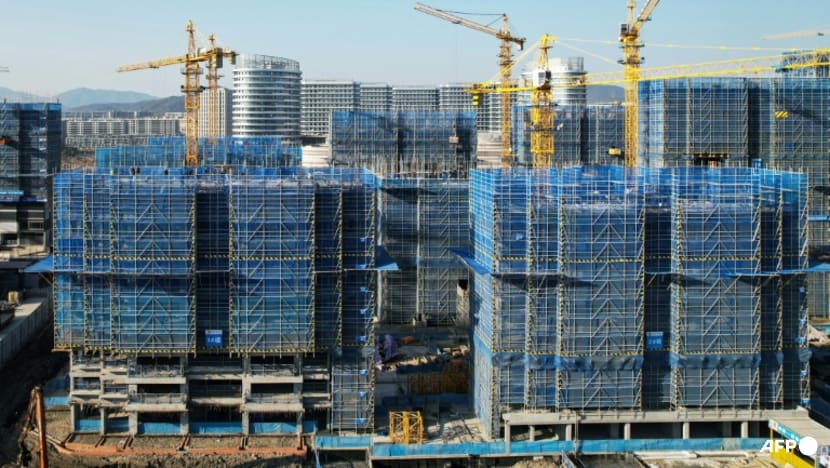Commentary: China’s housing mess finally comes for Xi’s own
Beijing is opening the door to a real estate bazooka. Bloomberg Opinion’s Shuli Ren doubts Chinese President Xi Jinping will bail out privately held developers.

A debt crisis in China's vast property sector has been a major drag on the world's number two economy. (Photo: AFP/STR)
HONG KONG: A third year into an unprecedented housing downturn, China’s President Xi Jinping seems to be finally getting worried, prompting speculation of quantitative easing and fuelling a bull run in Hong Kong-listed Chinese stocks.
The latest readout from the Politburo meeting, released on Apr 30, explains investors’ excitement. The country’s 24 most powerful men (yes, all men) appeared open to taking a different approach to resolving the property crisis, calling for coordinated measures to digest existing housing stock.
The last time the Politburo mentioned the real estate inventory issues was in mid-2016. A massive stimulus in the form of slum redevelopments ensued, with the People’s Bank of China unleashing more than 3 trillion yuan (US$416 billion) in pledged lending in support.
That initiative pulled China’s property and stock markets out of a slump. Since Beijing has been floating the idea of urban village renovation lately, Xi is essentially opening the door to his second bazooka.
Two main questions arise from the Politburo’s vague wording. First, what prompted the change of heart from Xi, who has largely sat on the sidelines while the real estate crisis unfolded? Second, how big will the state funding be this time around?
One possible explanation is that the broader economic slowdown aside, China’s property mess is finally coming for Xi’s cherished state-owned enterprises (SOEs).
VANKE, A QUASI-STATE-OWNED ENTERPRISE IN TROUBLE
A year ago, sales at SOE developers were recovering nicely. Unnerved by unfinished flats that private builders left behind, home buyers prized SOEs’ implicit guarantee that the government will step in if projects go sour and bought their apartments instead.
That did not last long. The second-hand real estate market, where developers are not involved, is booming. Buyers hunt for bargains and sift through deeply discounted listings.
In April, contracted sales at two top SOE developers, China Overseas Land & Investment Ltd and China Resources Land Ltd, slumped 36 per cent from a year earlier. They were not doing much better than their privately held peers.
With fewer refinancing options, some quasi-SOEs have already slipped into financial difficulties. China Vanke Co, which counts government-backed Shenzhen Metro Group Co as its largest – but not the controlling – shareholder, became a fallen angel this year. Its credit ratings were cut to junk territory.
UBS Group AG estimates Vanke needs 28 billion yuan in monthly contracted sales just to break even on a free-cash-flow basis. The developer has not hit this level this year yet, even though it did in most months of 2023.
Vanke’s plight is a prelude to what may come next. SOEs are beginning to have the same problems as their privately held peers. If the current bear market continues, they might also become distressed. The chickens are finally coming home to roost.
RESCUE WILL BE COSTLY
Granted, bona fide SOEs may never default – they can always refinance by borrowing from their sister banks. However, that will be costly.
Because of the predominant presales model, money from contracted sales – not bank loans – is the biggest source of financing for all builders. The longer Xi waits, the bigger his rescue package will have to be.
In terms of how the government will reduce excess supply, a few models have been proposed. For instance, with urban village redevelopment, local governments can buy older homes from households, which may then use the proceeds in the form of coupons to buy newer, bigger properties nearby.
Alternatively, the central government can establish a national acquisition platform to purchase unfinished projects from developers.
Whatever the model Beijing eventually adopts, I doubt much aid will go to privately held builders. China’s real estate sector has fundamentally changed, in that existing home sales will be the norm, as is the case with developed countries.
The industry no longer needs hundreds of developers. Most will have to liquidate and exit, and the few survivors are likely mostly SOEs, because they have better access to refinancing and thus more room to sail through the storm.
No doubt, state funding coming in to buy unwanted homes will be good news. Home prices can stabilise, which will please China’s middle class. SOE builders will breathe more easily.
But make no doubt: Xi is not bailing out privately held developers, whose cash will likely run out before a sustained housing rebound. Most won’t survive.
















